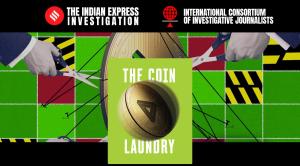Cong buries the Sikh massacre again
Twenty years after hundreds of Sikhs were massacred in the Capital, a judicial inquiry has for the first time given a finding that Congress ...

Twenty years after hundreds of Sikhs were massacred in the Capital, a judicial inquiry has for the first time given a finding that Congress leaders were involved in it.
The Justice G T Nanavati Commission, which was set up in 2000 to undo the ‘‘whitewash’’ by the Justice Ranganath Misra Commission in 1986, has indicted, among others, a minister in the Manmohan Singh Government, Jagdish Tytler, and Congress MP from the Outer Delhi constituency, Sajjan Kumar.
But, having waited till the last permissible day to table the Nanavati Commission’s report in Parliament, the Government today rejected the finding against Tytler on a ground that is bound to trigger a legal controversy.
The Commission concluded that there was ‘‘credible evidence against Jagdish Tytler to the effect that very probably he had a hand in organizing attacks on Sikhs.’’
In its action taken report (ATR), the Government however interpreted these carefully chosen words to mean that ‘‘the Commission itself was not absolutely sure about his involvement in such attacks.’’
And then, turning Indian jurisprudence on its head, the Government claimed that ‘‘in criminal cases, a person cannot be prosecuted simply on the basis of ‘probability.’’
This flies in the face of the fact that cases are registered—and even charges are framed—on the basis of probability. It is only at the stage of conviction does the system insist upon charges being proved beyond reasonable doubt.
Brushing aside the Commission’s recommendation to look into the allegations against Tytler and ‘‘take further action as may be found necessary,’’ the Government said that ‘‘any further action will not be justified.’’
The Government similarly stonewalled the recommendation to re-open seven of the cases against Sajjan Kumar. Two of those cases, it said, did not relate to the riots at all. In four other cases, the Government said ‘‘it will not be just to reopen’’ them as no fresh material has been produced before the Commission. It is only in one out of those cases did the Government agree to ‘‘look into the factual position’’ and take ‘‘appropriate action.’’
Two other Congress leaders figuring prominently in the Nanavati Commission report are Kamal Nath and H K L Bhagat. But neither figures in the ATR for different reasons: Kamal Nath because of the Commission’s finding that ‘‘in the absence of better evidence’’ it was not possible to say that he had instigated a mob and Bhagat because of his physical and mental condition in recent years.
The very fact that the allegations against various Congress leaders was either confirmed or left open by the Nanavati Commission in various degrees marks a major advance for the victims of the 1984 carnage.
This is because the Ranganath Misra Commission set up six months after the massacre gave a clean chit to the Congress party and its leaders, specifically including Bhagat. Any participation from the Congress camp, it said, was limited to party workers.
But the Nanavati Commission, having indicted some of the Congress leaders from Delhi, said that a ‘‘large number of affidavits indicate that local Congress(I) leaders and workers had either incited or helped the mobs in attacking Sikhs.’’
The Commission tempered this much awaited finding with a disclaimer. ‘‘There is absolutely no evidence suggesting that Rajiv Gandhi or any other high ranking Congress (I) leader had suggested or organized attacks on Sikhs.’’
|
ATR 2005: Avoid, Trash, Reject
|
||
| The Nanavati panel’s report is not the first on the 1984 riots. In 1986, the Ranganath Misra Commission conceded ‘‘there’s no reason to disbelieve allegations’’ but said it was ‘‘not in a position’’ to conclude that Congress organised the violence. The Misra panel was of the view that ‘‘some people’’ of the Congress ‘‘on their own indulged and participated in the turmoil’’ Here’s what Nanavati panel found and how the Govt has responded: Story continues below this ad
|
||
| JAGDISH TYTLER (Cong), Allegation: Instigated mob • Nanavati: Credible evidence, very probably had a hand • ATR: Very probably means panel not absolutely sure. Further action won’t be justified |
||
| Kamal nath (Cong), Allegation: Instigated mob • Nanavati: In absence of better evidence, not possible to say he instigated mob or was involved • ATR: No mention |
||
| H K L Bhagat (Cong), Allegation: led mob • Nanavati: Already acquitted, given his physical and mental condition no further action recommended • ATR: No mention |
||
| Sajjan Kumar (Cong), Allegation: led mob • Nanavati: Credible material, probably involved • ATR: No witness named Sajjan Kumar. Won’t be just to reopen case |
||
| Dharam Dass Shastri (Cong), Allegation: led mob • Nanavati: Credible evidence. Govt should direct investigation • ATR: Shastri not named as accused, Govt will examine factual position for appropriate action |
||
| P G Gavai (then Lt Gov) • Nanavati: Responsible for law and order in Delhi. Can’t escape responsibility • ATR: Gavai was replaced by M M K Wali as LG |
||
| S C Tandon (then police chief) • Nanavati: No explanation to say he was not properly informed • ATR: Replaced, has retired. Will consult Law Ministry on action if any |
||





- 01
- 02
- 03
- 04
- 05


























